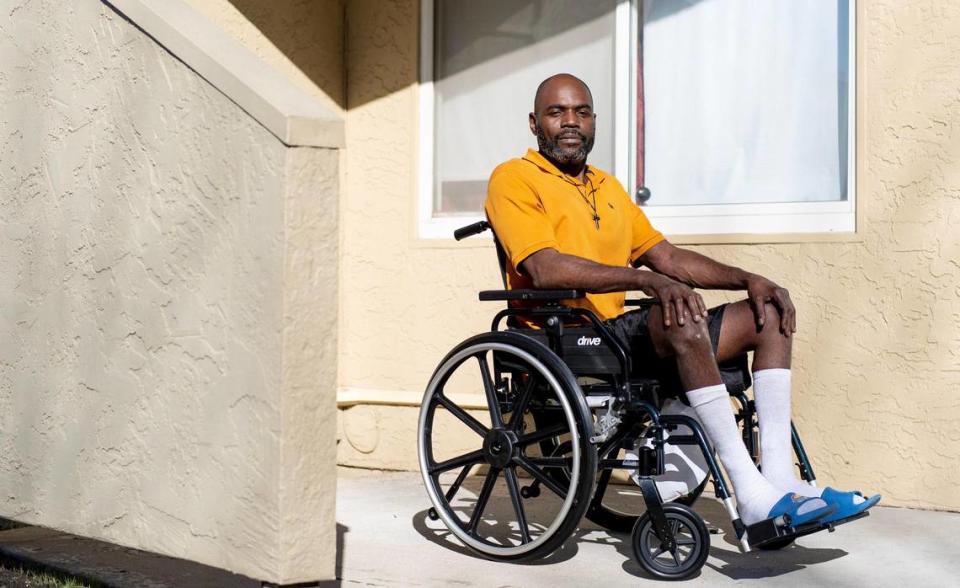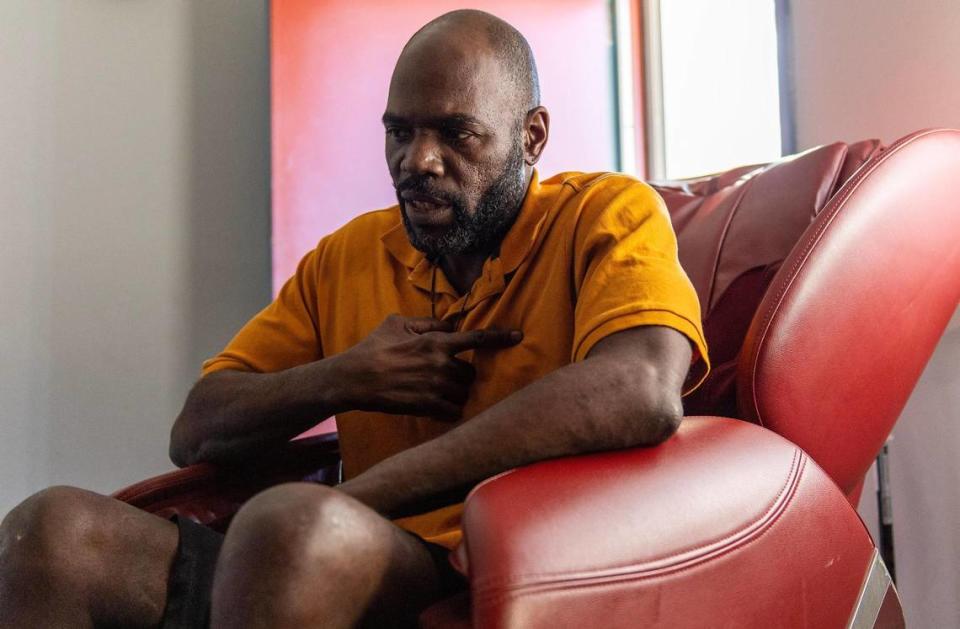Man claims Roger Golubski, other KCK cops made him play ‘Russian roulette’ as teen
Dion Martin remembers walking home one night in the mid-1980s when Roger Golubski, a Kansas City, Kansas, police officer, pulled up, handcuffed him and placed him in his squad car.
Martin, who believes he was 14 or 15, said Golubski told him they were going for a ride. Golubski made him lay down in the back seat, so he could only see the tops of buildings as Golubski drove from the center of KCK to near the James Street Bridge at the Kansas River, Martin said.
In a two-hour interview Monday with The Star, Martin recalled being taken out of the car once at the riverbank in an industrial area. He claimed he saw other officers — two of whom he remembers only by last name — and was told to get to his knees. As he faced the dark water, the officers took his crack cocaine and hundreds of dollars he made selling drugs or cutting his friends’ hair, Martin testified under oath earlier this year as part of another man’s lawsuit.
Then, Martin was told to strip to his boxers, he alleged, and the officers forced him to play “Russian roulette,” which, decades later, he described as torture. He claimed he heard the officers put a bullet in a revolver, spun the chamber, placed it to his head and pulled the trigger two or three times.
“Think you’re going to make it home?” the officers joked, according to Martin.
Now 51, Martin recalled being so terrified that he urinated himself. He feared the officers were going to kill him, he alleged. He said he cried and asked to be let go.
“I thought I was going to die,” Martin told The Star. “I really did.”

Golubski’s lawyer, Chris Joseph, said Golubski did not force anyone to play “Russian roulette” and denied ever stealing money or drugs. He questioned Martin’s motivations for making the allegations outlined in this story and said Martin has admitted to being a member of a violent street gang.
“His claim that police detained him and seized drugs and money is believable,” Joseph wrote in an email. “His claim that police stripped him naked and played Russian roulette is not believable.”
Golubski’s 35-year career as a KCKPD officer, detective and captain has come under intense scrutiny in recent months. He has been federally indicted twice since September on allegations that he raped Black women and used his position to protect criminals who sex trafficked underage girls in the 1990s.
Before then, Martin was deposed in January as part of a lawsuit brought by Lamonte McIntyre, who alleged Golubski framed him in a 1994 double murder he did not commit but for which he spent 23 years in prison before his release in 2017. Martin has also been interviewed by the FBI about his encounters with KCK officers.
In court filings, McIntyre’s attorneys claimed Martin was among “many” Black men who were abused by Golubski, who is white, during his tenure at the Kansas City, Kansas, Police Department.
“Men knew that Golubski, at any time he chose, could threaten, beat, shake down or terrorize any Black male he encountered,” the attorneys alleged in the lawsuit, which centered on McIntyre’s wrongful conviction and settled this summer for $12.5 million. “Along with other officers, he took men to isolated areas where he would strip them of all their belongings and threaten their lives.”
Golubski denied setting up McIntyre or engaging in “any of the corruption or misconduct” alleged by the exonerated man’s lawyers.
‘The perfect victim’
In his deposition, Martin testified that he believed he was taken to the riverbank three or four times.
Martin’s claims that he was kidnapped and forced to play a potentially lethal game are among the most egregious public accusations raised by witnesses in McIntyre’s case.
Sean O’Brien, a longtime local attorney and University of Missouri-Kansas City law professor, represented Martin during his deposition. O’Brien believes Martin, saying his allegations of Russian roulette are “similarly outrageous” to ones made by other KCK residents about Golubski.
He also described Martin as “the perfect victim” for Golubski.
“Because Golubski can say, ‘Who are you going to believe, a decorated police officer or a crack dealer?” O’Brien said. “He thought he could get away with almost anything with these folks.”

Joseph, Golubski’s attorney, said he does not know what would motivate Martin to lie. But Joseph said Martin, in his own interview with the FBI, told agents that Golubski investigated him in a 1990 shooting that sent him to prison for four years, meaning he is likely “not a fan” of Golubski. Joseph also noted Martin knows McIntyre and that he made his claims in “support of” McIntyre’s lawsuit.
Attorney Cheryl Pilate, who represented McIntyre, said she is confident in their witnesses.
“We’ve vetted them, their accounts are credible, they are consistent over time and many of them are consistent with each other as to the things that happened,” Pilate said.
Martin told The Star he received no money from the McIntyre settlement and had nothing to gain by speaking out now. When he was first contacted by a reporter at KCTV5 in October, Martin was too afraid to talk on camera and asked that the television station not use his full name.
Sitting in a reclining chair in his KCK apartment, a necklace with a cross hanging around his neck, Martin openly told The Star about selling crack when he was younger to help his mother pay the rent and his later criminal history, which included convictions for aggravated battery and drug possession.
He admitted his involvement in two shootings, which he described as acts of self-defense, and recounted other run-ins with KCK officers, in which he said he was punched and robbed. In his deposition in the McIntyre case, Martin testified he once fought with an officer who, in the 1990s, was indicted and then acquitted of assaulting a different man who was in custody and handcuffed.

Martin has also been shot six times — five times in the back in 2016, and once in the lung in 2019. He is in constant pain and relies on a wheelchair that is too small for him.
As for his alleged encounters with Golubski, Martin said he simply wants closure.
“I know I’m not the only one,” he said.
Accusations at the riverbank
In one of his pending federal cases, Golubski stands accused of repeatedly taking a teenage girl he was allegedly raping to an area by the Kansas River.
Golubski, now 69, put a dog leash around the child’s neck and made her crawl next to him there, according to federal prosecutors. Golubski threatened the middle schooler’s life if she did not do what he asked, saying she would “end up in the river with the fishes and no one would find her,” prosecutors with the Justice Department’s Civil Rights Division wrote in one motion.
Golubski, who retired from KCKPD in 2010, has pleaded not guilty to the charges, which could send him to prison for the rest of his life if he is convicted. His lawyer has called the allegations “uncorroborated.”
After his own alleged encounters at the river, Martin claimed the officers told him to not turn around for 10 minutes until they drove away. Left in just his boxers and socks, Martin said he ran to the safety of his home, sneaking into the garage so as to not worry his mother. Then, he cried.
Marvin Brantley Jr., who has known Martin for about 25 years, which included time in prison, said it was a “known scare tactic” for officers to take residents to the river, where it is noisy. Brantley said he was not taken there himself, but heard about it from other community members.
“There wasn’t no traffic cameras on the street lights back then,” noted Brantley, who said he has been interviewed by the FBI about Golubski. “Where was going to be your proof? What were you going to do, go to the police station and say, ‘He just took an ounce of drugs and a pistol off of me?”
When Martin was 15 or 16, he testified in his deposition, he and his mother tried to file a complaint, but they were turned away.
Joseph, Golubski’s lawyer, said Martin’s claim that he went to the police “does not fit” with his past statements that he was a member of a street gang. Later reached by The Star, Martin said he was not a major drug dealer nor affiliated with a national gang, but described him and his friends as “young boys” trying to help their families in a rough neighborhood.

Martin also said Golubski and other officers called him the N-word “plenty of times” — which Golubski’s lawyer denied.
About eight years after Martin alleges he was taken to the river, FBI agents investigating KCKPD in 1993 determined that formal complaints made by citizens about civil rights violations, such as severe beatings, represented “only the tip of the iceberg,” according to their memos. The names of the officers who were investigated are redacted from the FBI reports that have been released.
“The KCKPD does not investigate civil rights violations against its officers anymore than it investigates allegations of drug dealing or robberies committed by officers,” one agent wrote.
Under a new chief who took office last year, today’s KCKPD has vowed to review every case that Golubski investigated as a detective.
As for Martin, he said he still does not know why Golubski allegedly targeted him. He said he tries to “get away” from his disturbing memories of the officer.
“It was eating me up; it really was,” Martin said. “It still does.”

